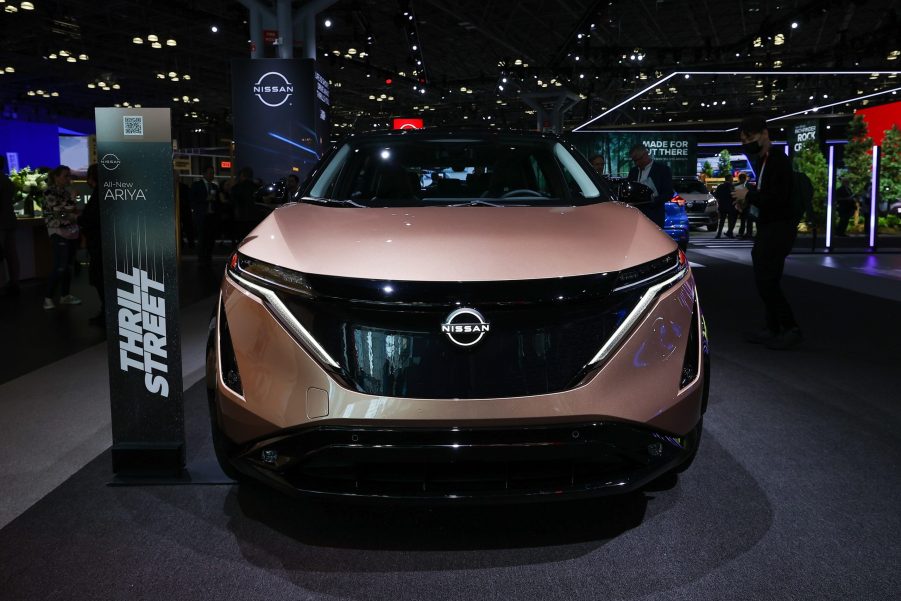
Nissan Might Supercharge U.S.A. EV Production With a 3rd Factory
Although the Leaf isn’t the first electric Nissan, it is one of the first modern affordable production EVs. And it’s partly because Nissan makes it in a local factory that it’s still affordable today. However, the EV segment is way more competitive these days, which means the Leaf can’t carry the brand alone. But that doesn’t just require more Nissan EVs—it also demands more dedicated production lines.
Nissan wants to make more electric cars in its U.S.A. factories

Even if you ignore the recent drama surrounding its former CEO, Nissan has had a rough financial time these past few years. However, after two straight years of losses, the automaker is bouncing back and planning head for its electric future. Nissan calls this electric roadmap ‘Ambition 2030,’ part of a larger program called ‘Nissan NEXT.’ And if Nissan wants to see 40% of U.S. sales come from EVs by 2030, it understandably needs to ramp up production.
As of this writing, Nissan only makes one electric car in the U.S.A., the Leaf, at its Smyrna, Tennessee factory. And though rumors claimed otherwise, the Leaf is sticking around for the foreseeable future. Well, at least through 2023. Regardless, it won’t be the only U.S.-made Nissan EV for much longer.
Earlier this year, Nissan invested $500 million into its Canton, Mississippi factory so it could produce electric cars, too. Moreover, the automaker says it wants to make the Canton plant “a center for EV manufacturing and technology.” That includes making two new EVs, one Nissan, and one Infiniti, at the plant by 2025.
However, Nissan might be thinking even bigger.
Its EV plans could involve a third U.S. factory to lower prices
Currently, the Leaf only accounts for 1.5% of Nissan’s annual U.S. sales, Automotive News reports. Hence why Nissan wants to introduce more electric vehicles here: more EVs to choose from means more sales. However, having more choices doesn’t really help if they’re all too expensive for regular consumers to afford.
Although EVs have gotten cheaper, as Mercedes-Benz recently noted, they’ll likely remain pricey for at least the next few years. But that’s why the Leaf is still affordable in the U.S.: it’s made here. That’s one of the benefits of localization, AN explains, as is the ability to quickly react to local demands. Nissan already got the ball rolling on that front when Envision ABC, the battery maker it partly owns, released plans for a Kentucky factory last month. And it might roll that ball further in the next few years.
According to Nissan Chief Operating Officer Ashwani Gupta, the automaker’s EV plans might require a third U.S. factory by 2030. This hypothetical plant wouldn’t necessarily just make EVs, AN notes, though they’d likely be the main focus. Gupta also didn’t specify if this potential factory would be an all-new facility or an expansion of an existing one. He didn’t reveal any timeline details, either. But seeing as Envision ABC’s facility won’t be open until 2025, Nissan likely wouldn’t open any new doors before then.
Which Nissan electric cars would be made in the U.S.A.?

As of this writing, Nissan hasn’t revealed which electric vehicles it plans to make in the Canton factory. It’s likely not the 2023 Ariya, as that’s made in Japan and wouldn’t be ‘all-new’ by 2025. AN claims the upcoming EVs have “a sedan-like profile with a sloping roofline,” which doesn’t match any recent Nissan concept. But the automaker will likely release more information and images in the future.
Since the hypothetical third factory is well, hypothetical, it’s even less certain what EVs Nissan could make there. However, Gupta did say Infiniti’s electric plans are “an important driver in the need to expand localized production” here, AN reports. As of this writing, Nissan only makes one Infiniti in the U.S.A., the QX60 SUV. So, making more Infiniti products here, especially electric ones, seems like a logical strategy.
Seems like Nissan chose the name of its EV plan well.
Follow more updates from MotorBiscuit on our Facebook page.


